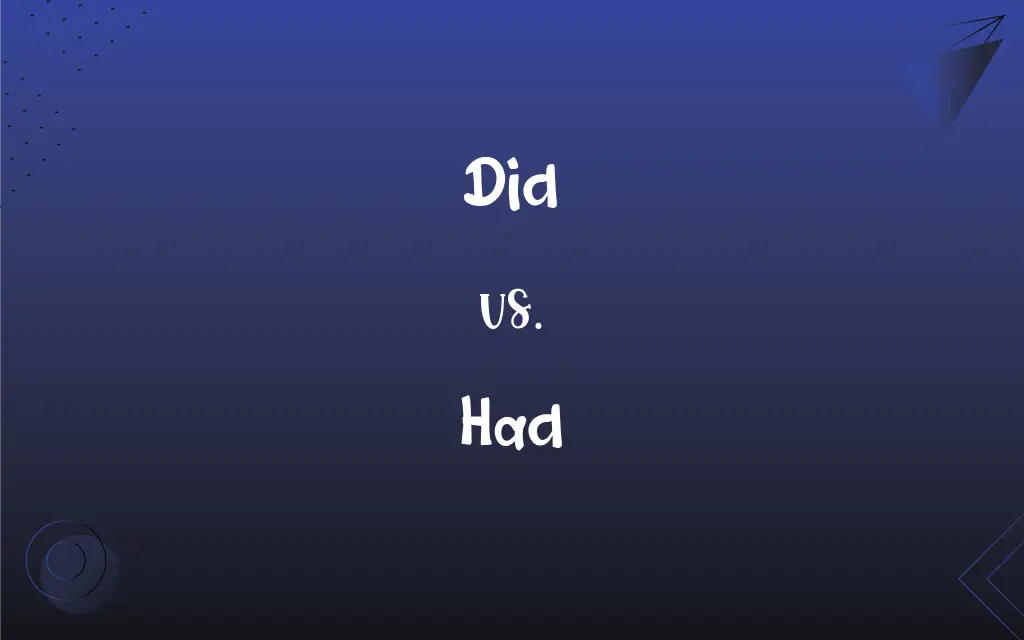Did vs. Had: What's the Difference?
Edited by Janet White || By Harlon Moss || Published on November 30, 2023
"Did" is the past tense of "do," indicating action completed in the past, while "had" is the past tense of "have," denoting possession or experience in the past.

Key Differences
"Did" is the past tense of the verb "do," used primarily to denote an action that has been completed in the past. It is commonly employed in forming questions or negative statements about past actions. For example, in the question "Did you go to the store?" "did" indicates the action of going occurred in the past. In contrast, "had" is the past tense and past participle of "have." It's used to signify possession or the existence of a condition in the past. An example sentence using "had" is "She had a great time at the party," where "had" denotes that the enjoyment happened in the past.
In the structure of sentences, "did" often serves as an auxiliary verb, especially in interrogative and negative sentences. When you ask, "Did he finish his work?" the use of "did" helps to form the question about a past action. "Had," however, plays a crucial role in forming the past perfect tense, which is used to talk about actions that were completed before another action in the past. A sentence like "He had finished his work before I arrived" illustrates this usage, where "had" is helping to set the timeline of past events.
The emphasis in a sentence can be significantly altered by the use of "did." It's often used to put stress on the verb that follows, especially in affirmative responses or emphatic statements, such as in "I did see that movie." Meanwhile, "had" can imply a sense of completion or culmination when discussing past experiences or states. In a sentence like "They had lived in New York for ten years," "had" emphasizes the duration and completion of the living experience.
In conditional or hypothetical constructs, "did" is less commonly used compared to "had." "Did" typically doesn't appear in conditional clauses but is more focused on factual or interrogative constructions about the past. On the other hand, "had" is extensively used in hypothetical or unreal situations, especially in the third conditional structure. A classic example is "If I had known, I would have acted differently," where "had" is pivotal in constructing the hypothetical scenario.
When considering their roles in questions about the past, "did" is more straightforward and direct, typically preceding the base form of the verb. In a question like "Did she call you?" "did" directly inquiries about a past action. In contrast, "had" can be used in more complex question structures, particularly in perfect tenses. Asking "Had she called you before you left?" uses "had" to probe into a sequence of events in the past, illustrating its complexity in handling past events and experiences.
ADVERTISEMENT
Comparison Chart
Basic Function
Past tense of "do," indicating past actions.
Past tense of "have," indicating possession or experience.
Usage in Sentences
Often used in questions and negatives.
Used for past possession, experiences, or actions.
Formation of Tenses
Simple past tense.
Forms past perfect tense when combined with past participle.
Emphasis
Focuses on the action performed.
Emphasizes the state or experience.
Example in a Question
"Did you eat dinner?"
"Had you eaten dinner before we called?"
ADVERTISEMENT
Did and Had Definitions
Did
Forms questions about past actions.
Did they arrive on time?
Had
Forms the past perfect tense.
They had finished their meal when we arrived.
Did
Used in negations in the past tense.
He did not understand the question.
Had
Indicates possession in the past.
She had a pet rabbit as a child.
Did
Used for emphasizing a past action.
I did try to call you.
Had
Expresses past necessity.
I had to leave early yesterday.
Did
Indicates a completed action in the past.
She did her homework last night.
Had
Used in conditional sentences.
If I had known, I would have helped.
Did
To contradict a negative statement.
I did see the movie, despite what you heard.
Had
Describes experiences in the past.
He had visited Paris before.
Did
Past tense of do1.
Had
Past tense and past participle of have.
Did
Past participle of do
Had
Simple past tense and past participle of have|cap=1.
This morning I had an egg for breakfast.
A good time was had by all.
Had
Used to form the past perfect tense, expressing an action that took place prior to a reference point that is itself in the past.
I felt sure that I had seen him before.
Had
As past subjunctive: would have.
Had
See Have.
And lever me is be pore and trewe.[And more agreeable to me it is to be poor and true.]
Him had been lever to be syke.[To him it had been preferable to be sick.]
For him was lever have at his bed's headTwenty bookes, clad in black or red, . . . Than robes rich, or fithel, or gay sawtrie.
Poor lady, she were better love a dream.
You were best hang yourself.
Me rather had my heart might feel your loveThan my unpleased eye see your courtesy.
I hadde levere than my scherte,That ye hadde rad his legende, as have I.
I had as lief not be as live to beIn awe of such a thing as I myself.
I had rather be a dog and bay the moon,Than such a Roman.
I had rather be a doorkeeper in the house of my God, than to dwell in the tents of wickedness.
FAQs
Is "had" only for possession?
No, "had" also forms the past perfect tense and expresses necessity or experiences in the past.
What is the basic function of "did"?
"Did" is the past tense of "do," used to indicate completed actions in the past.
How does "did" affect sentence structure?
"Did" often precedes the base form of a verb in questions and negatives.
Is "had" used in conditional sentences?
Yes, "had" is used in conditional clauses, especially in the third conditional.
Can "did" be used for emphasis?
Yes, "did" emphasizes actions in the past, often to clarify or contradict.
How do "did" and "had" form questions?
"Did" introduces questions about past actions; "had" is used in past perfect questions.
How is "did" used in emphatic statements?
"Did" is placed before the base verb for emphasis, especially in affirmative responses.
Is "had" used in past narratives?
"Had" is frequently used in narratives to describe past states or actions.
How is "had" used differently from "did"?
"Had" is the past tense of "have," used for past possession, experiences, or forming the past perfect tense.
Can "did" be used in negative sentences?
Yes, "did" is commonly used in negations about the past, like "did not."
Does "had" imply something no longer true?
Often, "had" indicates a past state or possession that may no longer be current.
What does "did" signify in past tense sentences?
"Did" confirms or asks about an action that happened in the past.
How does "had" express necessity in the past?
"Had" in phrases like "had to" expresses past obligations or necessities.
Can "did" and "had" be interchanged?
No, they serve different grammatical functions and are not interchangeable.
Does "did" always require a main verb?
Yes, "did" needs a main verb in its base form to complete its meaning.
Can "did" start a question about past actions?
Yes, "did" commonly starts questions regarding actions that occurred in the past.
Does "did" change the verb form that follows it?
"Did" is followed by the base form of the verb, without any tense modifications.
In what context is "had" used in hypothetical situations?
"Had" is used in hypothetical or conditional sentences, particularly in expressing unreal past situations.
Can "had" indicate past experiences?
Yes, "had" is often used to talk about past experiences.
What role does "had" play in the past perfect tense?
"Had" is used with the past participle to form the past perfect tense.
About Author
Written by
Harlon MossHarlon is a seasoned quality moderator and accomplished content writer for Difference Wiki. An alumnus of the prestigious University of California, he earned his degree in Computer Science. Leveraging his academic background, Harlon brings a meticulous and informed perspective to his work, ensuring content accuracy and excellence.
Edited by
Janet WhiteJanet White has been an esteemed writer and blogger for Difference Wiki. Holding a Master's degree in Science and Medical Journalism from the prestigious Boston University, she has consistently demonstrated her expertise and passion for her field. When she's not immersed in her work, Janet relishes her time exercising, delving into a good book, and cherishing moments with friends and family.






































































